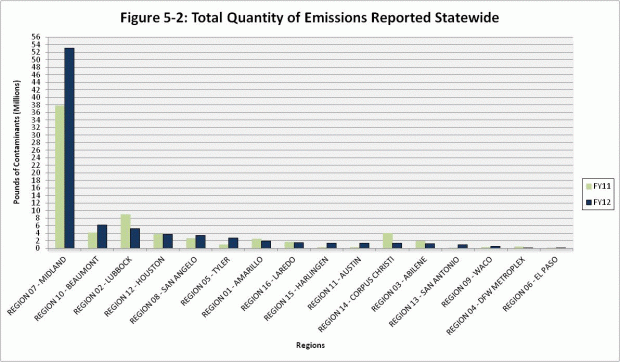Polluters and Penalties: Will Higher Fines Make a Difference in Texas?

Dave Fehling / StateImpact
TCEQ commissioner Toby Baker
For years, critics of how Texas enforces environmental regulations have charged that polluters didn’t pay enough when caught, that it was cheaper for big corporations to pay the fine than obey the law.
But the newest member appointed to the Texas Commission on Environmental Quality (TCEQ), Toby Baker, said changes made by the state legislature are putting more bite in enforcement.
“It’s still relatively early to see what kind of effect those higher fines are having. But the major emission events are getting fined at a higher level than they have in the past,” Baker told StateImpact Texas.
Starting in late 2011, the limit on pollution penalties jumped from $10,000 a day to $25,000 a day. Since enforcement cases can take months, if not years, Baker said gauging exactly how much deterrent value the higher fines will have is premature. But he believes it will be make a difference.
“I think it’s got people’s attention,” said Baker.

Dave Fehling / StateImpact
Rock Owens is with the Harris County Attorney's Office
Fines are ‘Cost of Doing Business’?
There are doubters.
“The $25,000 change is not near high enough to get anybody’s attention,” said Rock Owens, lead environmental lawyer for the Harris County Attorney’s office.
Located in Houston, home to some of the nation’s biggest petrochemical refining complexes, the County Attorney’s office has brought its own civil suits against polluters. Its lawyers have expressed frustration with what they said was a TCEQ more concerned with keeping a politically-powerful industry happy than with protecting people from pollution.
“In the past, the TCEQ’s policy regarding administrative penalties has been to accommodate the desires of industry, (imposing) penalties in amounts that are simply ‘the cost of doing business’”, said Owens.
Refinery Upsets
Larry Soward, who served as a TCEQ commissioner from 2006 to 2009, said “not many” companies are so cavalier as to consider fines as a business expense.

Dave Fehling / StateImapct
Larry Soward is a former TCEQ commissioner
But Soward told StateImpact Texas that one policy that still needs revamping are fines for what are called “upsets.” That’s when a refinery or petrochemical plant can emit tons of pollution in just hours after a major malfunction.
“If you’re only fining that company $10,000 a day, or even $25,000 a day, for a huge pollution event, that’s not really commensurate with the harm that’s being done,” said Soward.
Now with the clean air advocacy group Air Alliance Houston, Soward says he’s working to convince the TCEQ to dramatically increase those per-day fines for upsets.
One industry group has given support to higher fines. Sort of.
“The Texas Association of Manufacturers (TAM) supports the TCEQ’s efforts to ensure that the regulated community complies with environmental requirements,” said the industry group’s president, Tony Bennett, in comments submitted to the TCEQ. But he went on to say that while TAM believes higher fines could be a deterrent, the “assessment of maximum penalties should be reserved for the most egregious violations.”
Boom in Pollution Potential
According to the TCEQ’s Annual Enforcement Report, “notices of violation” totaled 14,474 in 2012, their highest level since 2007. But penalties and settlements actually dropped from the previous year, totaling $14,271,614 in 2012, compared to $17,610,544 in 2011.
The debate over the agency’s penalty policy comes as new challenges are developing for regulators: Refineries along the Gulf Coast are undergoing billions of dollars in expansion. And in the oil patch, drilling for oil and gas is booming.
But all that drilling is causing air pollution to soar. The TCEQ says of total pollutants emitted, the Midland area now leads the state with 53 million pounds in 2012. That dwarfs areas where refining dominates: the Beaumont region was ranked second, but with only 6 million pounds of pollutants emitted in 2012.
The TCEQ traces the pollution in West Texas to the enormous amount of oil well drilling that has outpaced the construction of pipelines and other infrastructure that otherwise would capture vapors released during the process. Instead, the TCEQ says, the gases are being burned off using flaring. The agency says flaring is generally an acceptable form of pollution control. (The dominant drilling regulator is the Texas Railroad Commission, which has a program to reduce flaring.)

Dave Fehling / StateImpact
Flares are an approved pollution control at oil and gas production facilities
“There are not many penalties associated with emission events in this area,” wrote TCEQ spokesperson Terry Clawson in an email.
Clawson said the amounts of pollution are not cause for alarm.
“These numbers are the result of a very large number of smaller sources spread out over a large geographical area that is not densely populated,” wrote Clawson, adding that air monitors in Odessa “do not indicate an area-wide concern regarding air quality.”

